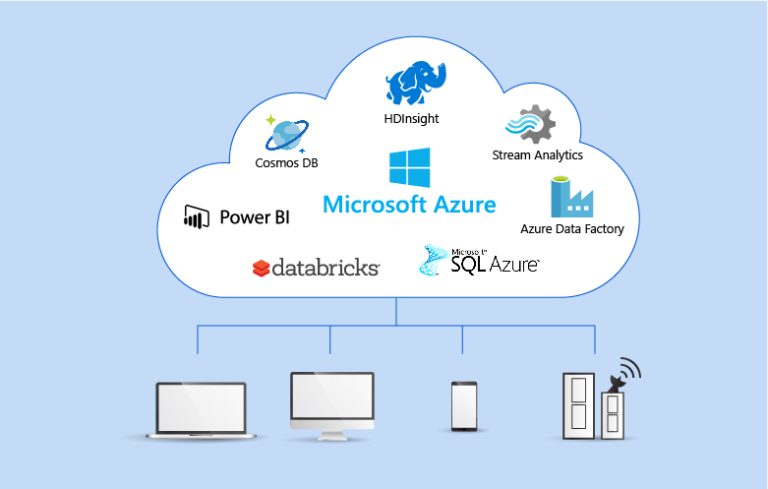Understanding the Microsoft Azure Ecosystem: An Overview
Microsoft Azure is a comprehensive cloud computing platform that offers an extensive range of services and tools for businesses and developers. The platform has experienced remarkable growth, with an increasing number of organizations adopting Azure for its flexibility, security, and innovative features. Consequently, the demand for skilled Microsoft Azure Developers has surged, making it a promising career path for those interested in cloud technologies.
Azure services span various domains, including infrastructure as a service (IaaS), platform as a service (PaaS), and software as a service (SaaS). These services cater to diverse business needs, such as virtual machines, databases, machine learning, IoT, and serverless computing. By leveraging these services, businesses can achieve cost savings, enhanced security, and increased efficiency. Microsoft Azure Developers play a crucial role in helping organizations harness the power of Azure to meet their unique objectives.
What Does a Microsoft Azure Developer Do? Key Responsibilities and Skills
A Microsoft Azure Developer is a professional responsible for designing, building, testing, and maintaining cloud-based applications and services on the Azure platform. Their primary role revolves around creating scalable, secure, and efficient solutions that meet client or business requirements. To excel in this role, one must have a solid understanding of Azure services, development tools, and programming languages.
Key responsibilities of a Microsoft Azure Developer include:
- Designing and implementing Azure-based applications and services.
- Collaborating with cross-functional teams to gather requirements and define project scopes.
- Creating and managing Azure resources, such as virtual machines, databases, and storage accounts.
- Optimizing applications for performance, cost, and security.
- Troubleshooting and resolving technical issues.
- Staying updated on Azure features, updates, and best practices.
Required skills for a Microsoft Azure Developer typically include:
- Proficiency in programming languages such as C#, Python, or JavaScript.
- Experience with Azure services, including Azure App Service, Azure Functions, Azure Kubernetes Service (AKS), Azure Cosmos DB, and Azure SQL Database.
- Familiarity with Azure development tools, such as Visual Studio, Azure DevOps, and Azure CLI.
- Understanding of cloud architecture, design patterns, and principles.
- Strong problem-solving and communication skills.
How to Become a Microsoft Azure Developer: Education and Certification
Becoming a Microsoft Azure Developer involves acquiring the right education and certifications to demonstrate your expertise in Azure services and development tools. This section outlines the steps to become a successful Azure Developer and highlights the most beneficial certifications to prioritize.
Educational Background
A bachelor’s degree in computer science, information technology, or a related field is typically required to become a Microsoft Azure Developer. Relevant coursework may include programming, databases, networking, and cloud computing. Supplementing your education with online courses, bootcamps, or workshops focused on Azure can further enhance your skills and knowledge.
Certifications
Microsoft Azure certifications validate your proficiency in Azure services and demonstrate your commitment to staying current in the field. The following certifications are particularly relevant for Azure Developers:
- Microsoft Azure Fundamentals: This entry-level certification covers the basics of Azure services, concepts, and terminology. It serves as a solid foundation for further Azure certifications.
- Microsoft Azure Developer Associate: This certification validates your ability to design, build, test, and maintain cloud applications and services on Azure. It covers topics such as Azure services, development tools, and programming languages.
- Microsoft Azure DevOps Engineer Expert: This advanced certification focuses on designing and implementing DevOps practices using Azure tools and services. It covers continuous integration, continuous delivery, dependency management, and application infrastructure.
Obtaining Microsoft Azure certifications can lead to career advancement, increased credibility, and higher salaries. Moreover, these certifications require periodic renewals, ensuring that your skills remain up-to-date with the latest Azure features and best practices.
Real-World Azure Development: Top Tools and Frameworks
Microsoft Azure Developers utilize various tools and frameworks to streamline development, improve productivity, and ensure efficient Azure-based solutions. Familiarity with these tools is essential for success in an Azure Developer role. This section introduces some of the most popular tools and frameworks used by Azure Developers.
Visual Studio
Visual Studio is a powerful integrated development environment (IDE) from Microsoft, supporting multiple programming languages, including C#, VB.NET, Python, and JavaScript. It offers features such as code completion, debugging, and profiling, making it an ideal choice for Azure development. Visual Studio integrates seamlessly with Azure services, allowing developers to publish, manage, and monitor Azure applications directly from the IDE.
Azure DevOps
Azure DevOps is a suite of tools designed for software development teams, providing services such as source control, continuous integration/continuous delivery (CI/CD), project tracking, and collaboration. Azure DevOps supports Azure development by offering features tailored to the platform, such as Azure Resource Manager (ARM) templates, Azure Pipelines, and Azure Boards. These tools help developers manage the entire application lifecycle, from planning to deployment and monitoring.
.NET
.NET is a free, open-source framework for building various types of applications, including web, desktop, mobile, and cloud-based solutions. The .NET framework includes languages such as C# and F# and supports multiple platforms, such as Windows, Linux, and macOS. Azure developers can leverage .NET to build scalable, secure, and high-performance applications that integrate seamlessly with Azure services.
Other Tools and Frameworks
Other popular tools and frameworks used by Azure Developers include:
- Azure CLI: A command-line tool for managing Azure resources.
- Azure PowerShell: A scripting language for automating Azure tasks.
- Terraform: An open-source infrastructure as code (IaC) software tool for building, changing, and versioning infrastructure safely and efficiently.
- Docker and Kubernetes: Containerization and orchestration platforms for deploying and managing applications in Azure.
By mastering these tools and frameworks, Azure Developers can enhance their skills, increase productivity, and deliver high-quality solutions that meet the growing demand for Azure expertise.
Designing Scalable Solutions with Microsoft Azure: Best Practices
Microsoft Azure offers a wide range of services and tools to help developers build scalable, secure, and cost-effective solutions. Adhering to best practices is crucial for ensuring optimal performance, reliability, and maintainability. This section outlines essential best practices for designing scalable solutions using Microsoft Azure.
Architectural Patterns
Implementing appropriate architectural patterns is vital for building scalable Azure solutions. Some common patterns include:
- N-tier architecture: Separating an application into logical layers, such as presentation, application, and data tiers, to improve scalability and maintainability.
- Microservices architecture: Breaking down a monolithic application into smaller, loosely coupled services that can be developed, deployed, and scaled independently.
- Serverless architecture: Building applications using event-driven functions and managed services, eliminating the need to manage infrastructure.
Cost Optimization
Optimizing costs is essential when designing scalable Azure solutions. Consider the following strategies:
- Utilize Azure’s built-in cost management tools to monitor and control spending.
- Leverage Azure Reservations for discounted rates on virtual machines, SQL databases, and other resources.
- Implement auto-scaling rules to scale resources up and down based on demand.
- Choose appropriate storage options, such as Azure Blob Storage or Azure Files, based on access patterns and performance requirements.
Security Considerations
Security is a critical aspect of designing scalable Azure solutions. Keep the following considerations in mind:
- Implement Azure’s built-in security features, such as Azure Security Center and Azure Monitor, to protect your applications and data.
- Follow the principle of least privilege, granting users and services the minimum permissions required to perform their tasks.
- Encrypt sensitive data at rest and in transit using Azure’s encryption services.
- Regularly review and update security policies and procedures to address new threats and vulnerabilities.
By following these best practices, Microsoft Azure Developers can design scalable, cost-effective, and secure solutions that meet the growing demands of businesses and organizations.
Networking and Collaboration: Engaging with the Azure Developer Community
Networking and collaboration are essential aspects of professional growth for Microsoft Azure Developers. Engaging with the Azure developer community offers numerous benefits, such as learning from experienced professionals, sharing knowledge, and staying updated on the latest trends and best practices. This section highlights resources for Microsoft Azure Developers to connect, learn, and collaborate with their peers.
Forums
Online forums are an excellent platform for asking questions, sharing experiences, and seeking advice from the Azure developer community. Some popular forums include:
- Microsoft Q&A: A forum for Microsoft product experts and the community to provide answers and help solve problems.
- Stack Overflow: A question-and-answer platform for programmers, with a dedicated tag for Microsoft Azure-related questions.
Meetups
Meetups are local or virtual gatherings where Azure Developers can network, learn, and collaborate. Some popular Azure Developer meetups include:
- Microsoft Azure Meetup Groups: A collection of local and virtual meetups focused on Microsoft Azure technologies.
- Global Azure Bootcamp: An annual one-day event for Azure Developers to learn, share, and network.
Online Communities
Online communities provide a platform for Azure Developers to connect, collaborate, and share knowledge. Some popular online communities include:
- Microsoft Tech Community: A platform for Microsoft customers, partners, and community members to connect and collaborate.
- GitHub: A platform for sharing and collaborating on open-source projects, with a dedicated Microsoft Azure organization.
By actively participating in the Azure developer community, Microsoft Azure Developers can enhance their skills, expand their network, and contribute to the growth and success of the Azure ecosystem.
Career Opportunities and Growth for Microsoft Azure Developers
The demand for skilled Microsoft Azure Developers is on the rise, driven by the increasing adoption of cloud technologies by businesses worldwide. As a Microsoft Azure Developer, you can expect various career paths and growth opportunities, with competitive salaries and numerous benefits. This section explores potential career paths and the advantages of working with Microsoft Azure.
Career Paths
Microsoft Azure Developers can pursue several career paths, including:
- Cloud Solutions Architect: Designing and orchestrating cloud-based solutions for businesses, integrating various Azure services and tools.
- Azure DevOps Engineer: Focusing on the development, deployment, and management of Azure-based applications and services using tools like Azure DevOps and GitHub.
- Cloud Security Engineer: Ensuring the security and compliance of Azure-based solutions, implementing best practices and tools to protect sensitive data and applications.
- Data Engineer or Data Scientist: Working with Azure’s data services, such as Azure Synapse Analytics, Azure Databricks, or Azure Cosmos DB, to process, analyze, and visualize large datasets.
Advantages of Working with Azure
Working with Microsoft Azure offers several benefits, such as:
- In-demand skills: Azure skills are highly sought after, with a growing number of businesses adopting Azure for their cloud needs.
- Versatility: Azure supports a wide range of programming languages, tools, and frameworks, allowing developers to work with their preferred technologies.
- Innovation: Azure is continuously evolving, introducing new services and features, providing opportunities for developers to learn and grow.
- Community support: Azure has a large and active developer community, offering resources for learning, collaboration, and networking.
By pursuing a career as a Microsoft Azure Developer, you can enjoy a rewarding and challenging profession with ample growth opportunities and the chance to work with cutting-edge technologies.
Staying Updated: Following Azure News and Trends
Staying informed about the latest Azure news, trends, and updates is crucial for Microsoft Azure Developers to maintain their expertise and stay competitive in the job market. By following official Microsoft blogs, podcasts, and newsletters, developers can keep up with the ever-evolving Azure landscape. This section introduces resources for Azure Developers to stay updated and engaged with the Azure community.
Official Microsoft Blogs
Microsoft maintains several blogs dedicated to Azure-related news, updates, and announcements. Some popular blogs include:
- Microsoft Azure Blog: The official blog for Microsoft Azure, covering news, announcements, and updates across various Azure services.
- Microsoft Open Source Blog: A blog focusing on Microsoft’s open-source initiatives, including Azure-related projects and collaborations.
- Microsoft Tech Community: A platform for Microsoft customers, partners, and community members to connect, collaborate, and share knowledge about Azure and other Microsoft technologies.
Podcasts
Podcasts are an excellent resource for staying informed and engaged with the Azure community. Some popular Azure-related podcasts include:
- Azure Friday: A weekly show where Microsoft engineers and cloud advocates share insights and updates about Azure services and tools.
- CloudSkills.fm: A podcast focused on cloud technologies, including Azure, with episodes covering best practices, news, and interviews with industry experts.
Newsletters
Subscribing to Azure newsletters can help developers stay informed about the latest news, trends, and updates. Some popular Azure newsletters include:
- Microsoft Azure Newsletter: A monthly newsletter featuring Azure news, updates, and events.
- Azure Chief: A weekly newsletter curating Azure news, updates, and articles from around the web.
By following these resources, Microsoft Azure Developers can stay updated on Azure news and trends, ensuring they remain at the forefront of the cloud computing industry.






